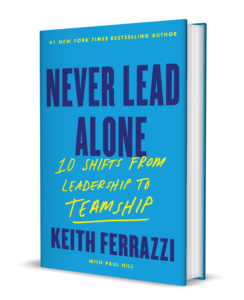Before I meet with any new prospect I’ve been thinking of introducing myself to, I make damn sure I do my homework. And when I say homework, I mean more than checking to see if the company has a website by typing www.amazon.com to do research on a marketing executive at Amazon. Sure, you should be up-to-date with the major news about the prospect’s company. But what you really want to know is more personal. Think of it this way: A good salesperson does research on companies; a great salesperson does research on people.
I like to have a one-page synopsis on the person with all kinds of information. I want to know what’s important to him: his hobbies, his family, his most remarkable achievements, what he’s most passionate about. The only criterion for what should be included is that it reflects something about the person as a human being. Even stuff about the person’s company has to be something that affects him personally, in his daily life.
Did the company have a good quarter but is the division the prospect runs on the rocks and his career status questionable? Is there a freeze on hiring at the company, and he’s pissed that his team is overworked and others aren’t pulling their weight? What about his favorite charity? What college he went to? How many kids? These are the things that matter to him. And trust me, even the most giving, humble people naturally care, above and beyond anything else, about what it is they do. If you can show that you care, too, and have understanding or even a way to help, you’ll feel the appreciation radiate from them and cover you.
The purpose of all this research is to find a point of common ground that is deeper and richer than what can be discovered in a serendipitous encounter. Before I met one CEO, with whom I shared no affiliations or organizations, I found out she had run the New York Marathon by simply doing a Google search. (Note: You won’t find the personal stuff on the company website. You’ll have to dig through the more obscure search results like college class notes and old articles in which they talk about their lives.) When I ran into her, I was able to say, “You know, I don’t know how you do it. I like to think I’m in great shape, but just the training for a marathon killed me.”
Of course, she was surprised. “How the heck did you know I ran a marathon?” she happily quipped. Here’s the best part of doing your homework — it doesn’t have to be a secret. In fact, I never shy away from mentioning the research I’ve done. I told this particular CEO, “I always make a special effort to inquire about the people I’d like to meet.” Inevitably, people are flattered. Wouldn’t you be? Instantly, the other person knows that rather than suffering through a strained half-hour with a stranger, she’s able to connect with someone with whom she shares an interest, someone who has gone out of his way to get to know her better.





